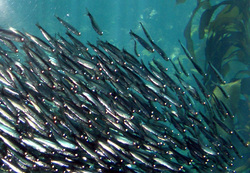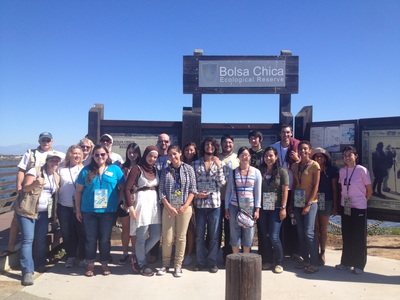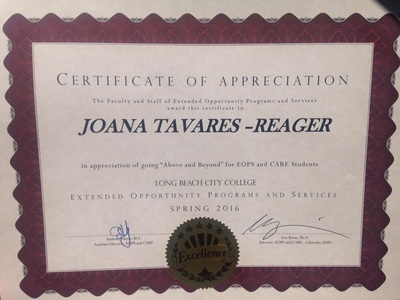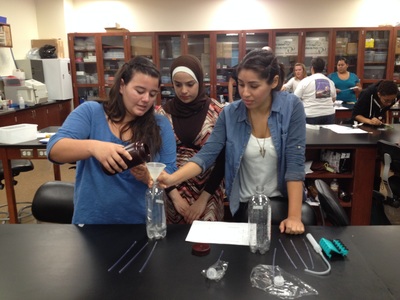HELLO STUDENTS OF THE OCEAN
The ocean is such an important part of our lives! It controls our planet's climate, recycles a number of extremely important chemicals, provides us with incredibly valuable resources and yet, we know so little about it! That in itself is my greatest motivation to teach oceanography. But I'm also keen on the teaching experience itself! I love the feeling of learning something new- that "a-ha moment", in which the world just seems to make more sense all of a sudden- and I feel equally rewarded when I can help others to learn as well. Thus, I spend a lot of time working to become a better teacher and looking for more efficient and fun ways to get the message across.
I teach oceanography at a number of community colleges and if you are visiting this page, chances are you are taking one of my classes or considering to take it. Here, I tried to summarize my teaching methods and to compile some tips and recommendations to do well in a College-level Introduction to Oceanography Course.
What will you be learning in a college-level Oceanography Course?
Most oceanography introductory courses will cover different aspects of marine geology, ocean chemistry, physical oceanography and marine biology. Specific topics in those fields include, for example, plate tectonics, the carbon and other biogeochemical cycles, waves, tides, atmospheric circulation, winds and ocean currents, in addition to marine food webs and biodiversity.
It's important to realize, however, that oceanography is an interdisciplinary subject, and that means that we will be focusing mostly on the intersections of these fields, rather than on the details. Thus, our overall goal will always be to "connect the dots" by addressing how one field affects the other. I also incorporate some topics related to marine management, policy and conservation, as I think these are timely issues that all of us, earthlings, should understand and think about.
Socratic Method, Flipping the Classroom, Team-based Learning and other teaching methods... what's all that?
I strongly believe that real learning- the type that will provide you with knowledge and skills that will continue enriching your life long after the course is over- can only happen when you, the student, is in charge of the learning process.
My experience as a student, researcher and teacher has convinced me that in order to absorb new information we must first figure out how that new information would fit in a bigger picture, then break it down into a series of questions that can be tackled from different points of view to finally regroup all the answers and ideas into a new big picture, one that now includes the "new" information or concept just learned. I din't invent this! In fact, this system of breaking ideas down by asking questions about it dates all the way back to 400 BC, when the Greek philosopher Socrates carried out this method with his students.
Okay, so what does that mean to you, a student in my oceanography class?
In our Oceanography class, we will be using a version of the Socratic Method to explore each of the topics listed on the syllabus. Each week, you will receive a list with "Discussion Questions" that you will use to prepare for the next lecture. You will then use your textbook and online resources to find answers to this questions, so that you can participate of in-class discussions and activities.
In the beginning of the term, I will be providing you with most of the Discussion Questions, but by the middle of the semester, you will be formulating your own questions. That, will hopefully empower you to tackle any subject you may ever decide to learn in the future and I believe is the most valuable thing I cold possibly teach you.
What about Flipping the Classroom, what's that?
I had been teaching using this "somewhat Socratic method" for while, when I then heard about "Flipping the Classroom". I love the concept because it builds on this idea that our time together is quite valuable and should be used for the aspects of the learning experience that you can't do on your own: articulating, debating and checking what you've learned from the readings and videos.
It's therefore very important that you prepare for each class by answering the Discussion Questions ahead of time.
At the end of each week, I provide students with a list of Review Questions which are more elaborate problems and questions that you will be able to answer and practice in preparation for tests and exams.
And team-based learning? What's that?
Finally, we will also be applying the strategies and approaches used for Team-based Learning. Once again, the idea is that by talking to others about what you are trying to learn, you will have a chance to incorporate those new concepts into your own narrative. "Why is this concept important to us?", "How does it affect the world around us, ourselves, and others?" - these are important questions that can only be fully realized once we verbalize them. Also, team-based learning can help you in identifying other facets of the problem you are tackling. We can always learn more by getting a different perspective on the matter!

So, how will you be graded? What if you are shy or if you don't like working in groups?
You will most often be evaluated and graded individually, but your participation in the class discussions and group activities will be very important. Of course I know that some students are more shy than others, but that's okay- we always find a way to tap into everyone's strengths and make the most out of the experience. The reality is that this day in age, the overwhelming majority of career paths will require you to cooperate with others and work in teams. Thus, it is of course better for you to learn these skills now than to struggle with them later. As for evaluations, I offer a number of different forms of evaluations, including pop quizzes, take-home assignments, and traditional in-class exams. The goal is to make sure you learn how to do well in all different forms of examinations that exist out there, so that you can excel in whatever other courses you decide to take afterwards.
How much time will you need to devote to this course?
You should expect to spend about 2-3 hours per week answering the Discussion Questions before the lectures and another 2-3 hours per week reviewing the work we did together in class and answering the Review Questions. I do not grade these lists, but you will find it hard to keep up with the rest of the class if you don't work on those lists regularly. I would, therefore, strongly recommend that you put some effort into managing your time. You should sit and look at your weekly schedule to make sure that you will have enough time to devote to this course. If you find out that for any reason (such as your work load for other classes, your job or other personal issues) you won't be able to dedicate the extra hours of studying required for this course, I'd recommend you not to sign up for it at this time.
Are there prerequisites or requirements to taking a college-level Introduction to Oceanography course?
No and yes. While most colleges do not require you to take other courses before you enroll in this class, having good fundamental math, reading and writing skills will make a world of difference! The math skills that you will need for this course are mainly those from basic algebra (operations with variables, fractions, percentages and graphs). Not being good in math (or not linking it!) is certainly not an impediment to taking this class, but you should expect to have to study a couple extra hours in order to compensate for that. As for the reading and writing skills, those are truly crucial for your success in this class, as you will be required to read a lot in preparation for class and to write short and long essays as part of your evaluations. All colleges, however, offer some sort of support system, such as writing centers, tutoring services or study groups. I strongly recommend you to seek help earlier in the term to make
sure you can handle the class work before you commit to it.
You will most often be evaluated and graded individually, but your participation in the class discussions and group activities will be very important. Of course I know that some students are more shy than others, but that's okay- we always find a way to tap into everyone's strengths and make the most out of the experience. The reality is that this day in age, the overwhelming majority of career paths will require you to cooperate with others and work in teams. Thus, it is of course better for you to learn these skills now than to struggle with them later. As for evaluations, I offer a number of different forms of evaluations, including pop quizzes, take-home assignments, and traditional in-class exams. The goal is to make sure you learn how to do well in all different forms of examinations that exist out there, so that you can excel in whatever other courses you decide to take afterwards.
How much time will you need to devote to this course?
You should expect to spend about 2-3 hours per week answering the Discussion Questions before the lectures and another 2-3 hours per week reviewing the work we did together in class and answering the Review Questions. I do not grade these lists, but you will find it hard to keep up with the rest of the class if you don't work on those lists regularly. I would, therefore, strongly recommend that you put some effort into managing your time. You should sit and look at your weekly schedule to make sure that you will have enough time to devote to this course. If you find out that for any reason (such as your work load for other classes, your job or other personal issues) you won't be able to dedicate the extra hours of studying required for this course, I'd recommend you not to sign up for it at this time.
Are there prerequisites or requirements to taking a college-level Introduction to Oceanography course?
No and yes. While most colleges do not require you to take other courses before you enroll in this class, having good fundamental math, reading and writing skills will make a world of difference! The math skills that you will need for this course are mainly those from basic algebra (operations with variables, fractions, percentages and graphs). Not being good in math (or not linking it!) is certainly not an impediment to taking this class, but you should expect to have to study a couple extra hours in order to compensate for that. As for the reading and writing skills, those are truly crucial for your success in this class, as you will be required to read a lot in preparation for class and to write short and long essays as part of your evaluations. All colleges, however, offer some sort of support system, such as writing centers, tutoring services or study groups. I strongly recommend you to seek help earlier in the term to make
sure you can handle the class work before you commit to it.



